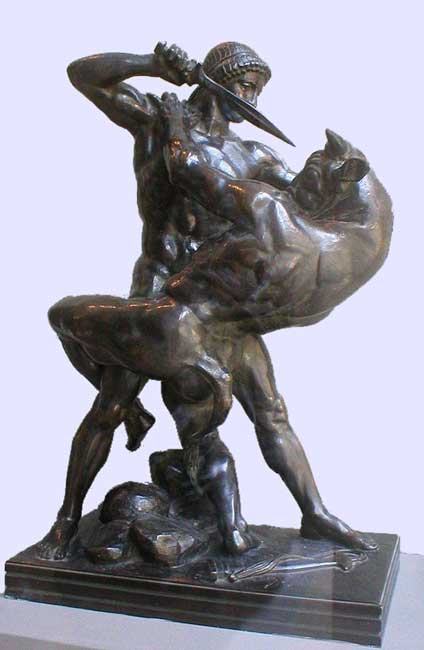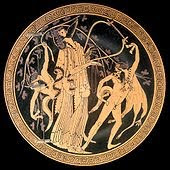
Pallas had fifty giant sons, called the Pallantids, but Aegeus, despite having been married twice, had no children at all. After his second wife died without bearing a child, Aegeus decided to consult the oracle of Apollo at Delphi, to learn if it was his fate never to have a son. The oracle promised that some day he would indeed have a son to inherit his kingdom.
On his way back from Delphi, Aegeus stayed with his friend Pittheus. There he fell in love with Pittheus’s beautiful daughter Aethra and, with her father’s blessing, married her. They kept the marriage a secret from all others, because Aegeus feared that his jealous brother might move to seize the throne of Athens if he knew that the oracle had promised Aegeus a son, and that Aegeus had taken another wife.
When Aegeus returned to Athens, he left Aethra with her father, for he feared she would come to harm if Pallas knew she was Aegeus’s wife. Before leaving Pittheus’s kingdom, Aegeus buried his sword and sandals under a heavy rock, telling Aethra that if she bore a son, she should bring him to the rock on the day he turned sixteen. If he had the strength to move the rock, he should put on the sword and sandals and go to Athens to be recognized as Aegeus’s heir.
When the child was born, he was given the name Theseus. No one was told who his real father was—not even Aegeus himself. Pittheus and Aethra feared that if Aegeus knew he had a son, he might let the information slip out, and Pallas’s spies, who were everywhere, would inform him, putting the baby’s life in danger. Instead, Pittheus and Aethra let it be rumored that the infant’s father was Poseidon, the mighty god of the sea.

When Theseus was sixteen, Aethra took him to the rock to test his strength. He moved the rock easily. Then she told him to put on the sword and sandals, and to go to Athens to make himself known to his father. Pittheus and Aethra tried to persuade Theseus to travel by water, rather than attempting the long, dangerous overland journey, but the adventurous young man was determined to seek out and overcome challenges, to prove his mettle before presenting himself to his father in Athens.
Along the way he encountered and defeated many monsters and enemies, including the treacherous Procrustes. Procrustes would offer hospitality to weary travelers, but when they lay down to sleep, they would inevitably find that the bed was either too short or too long. If the bed was too long, the poor traveler would be stretched mercilessly until he fit the bed. If it was too short, Procrustes would cut off his feet and as much of his legs as necessary to make the traveler fit the bed.
No one knows exactly how Theseus outwitted Procrustes or what he did to punish him, but after Theseus spent the night as Procrustes’s “guest,” Theseus was as healthy as ever—and Procrustes was never heard from again.
Theseus performed so many heroic deeds along the way to Athens that by the time he reached the city people were already talking about this young hero whose deeds were beginning to rival those of Hercules himself. King Aegeus was a bit nervous about this approaching hero: What if he had come to overthrow Aegeus and take his place on the throne? But when the stranger presented himself to Aegeus, the king could scarcely contain his joy, for he realized that the young man was wearing the sword and sandals he had buried beneath the rock for his son to find one day.
Unfortunately, the king’s joy in meeting his son soon turned to sorrow—a sorrow felt by all of Athens. It was a time of year that everyone dreaded: the time when Athens must pay its yearly tribute to King Minos of Crete. This merciless king demanded not gold or trade goods from Athens, but rather seven youths and seven maidens to be offered as sacrifice to the dreadful Minotaur, a huge monster with the head of a bull and the body of a man, who fed only on human flesh. The Minotaur lived at the heart of the great Labyrinth designed by Dedalus, a maze so intricate that no one could possibly find a way out of it. Even if by some miracle one of the Athenians managed to escape being devoured by the Minotaur, he would still have no hope of surviving, for he would soon starve to death in the Labyrinth.

Though cruel, the tribute demanded by Minos was not entirely without reason. Many years earlier, Minos’s most beloved son, Androgeus, had come to compete in the Athenian games. A superb athlete, Androgeus had triumphed in every competition. But on his way to compete in the games at Thebes, Androgeus had mysteriously disappeared. It was rumored that he had been ambushed and murdered by some of the men he had defeated and humiliated in the Athenian games.
The rumor was actually a lie deliberately spread by agents of King Aegeus. Knowing that Androgeus was very friendly with the Pallantids, Aegeus feared that Androgeus would persuade his father to support Pallas in a war against Athens. Since Minos had the most powerful navy in the known world, Athens could never withstand an attack by Pallas if he had the support of Crete. Aegeus had Androgeus waylaid on the road to Thebes, intending to have him held captive long enough to be persuaded to support Aegeus, or at least not to interfere on the side of Pallas if the two brothers should end up at war with each other. But Androgeus was a brave man. Though vastly outnumbered, he fought so fiercely that he was accidentally killed in his struggle with his would-be captors.
King Minos refused to believe the rumor that Androgeus had been killed by jealous athletic competitors. He sent his own spies to discover the real story. Once he knew what had happened to his son, his fury boiled over. He destroyed Athens’ ally Megara, and intended to destroy Athens as well. To save his city, King Aegeus had to agree to the enraged king’s bitter demands. Minos had lost his beloved son to the scheming of Athenians, so every year, he would deprive Athens of its own sons and daughters.
The victims were chosen by lot. Theseus volunteered to go in place of one of the youths, but Aegeus would not hear of it. Theseus insisted, assuring his father that he would kill the Minotaur and get Minos to remit the yearly tribute. Seeing that he could not change his son’s mind, Aegeus surrendered to the inevitable and agreed at last to allow him to face the Minotaur.
The ship the young Athenians were to travel in had black sails. Theseus also had a set of white sails made. He told his father that when the ship returned from Crete, it would hoist the white sails to let him know that his son and heir still lived.
When the Athenians arrived on the island of Crete, they were locked up, but on the way to the prison, they were paraded through the town. Minos’s two daughters, Ariadne and Phaedra, were watching the prisoners when Eros, on orders from his mother Aphrodite, who was particularly fond of Theseus, shot the elder sister with one of his arrows. Ariadne immediately fell in love with Theseus and determined to save him from the Minotaur.
She went to the prison and persuaded the guards to let her in to see the prisoners. She offered her help to Theseus, if he would promise to take her to Athens and marry her—not just because she loved him, but also because she was sure her father would have her killed once he learned she had betrayed him.
That night, as her father slept, she stole from him the key to the Labyrinth’s door. She led Theseus to the Labyrinth and handed him a ball of golden twine. She told him to tie the twine to the handle of the door and unwind it as he made his way through the Labyrinth. He would then be able to follow it back out once he had slain the Minotaur. As for that task, she explained to him that at midnight the Minotaur would go to sleep for exactly one hour, and Theseus would then have an opportunity to kill the creature.
After he had killed the sleeping Minotaur and followed the string out of the Labyrinth, Theseus rejoined Ariadne, and they returned to the prison. The guards were fast asleep, for Ariadne had supplied them with drugged wine. She released all of the Athenians, and they went down to the harbor. There they bored holes in all of the Cretan ships before setting sail in the ship that had originally brought them to Crete. When the Cretan ships attempted to pursue the Athenians, they all sank.

On the way to Athens, Theseus had the ship put in for awhile at the island of Naxos, to replenish their supplies of food and fresh water. As Ariadne slept in a field full of poppies, Theseus suddenly ordered the ship to set sail, leaving Ariadne behind. Some say he had a dream that Ariadne would one day betray him as she had once betrayed her father. Others say that Theseus believed he saw King Minos’s own ship approaching the island in pursuit of the escaped Athenians. Whatever the reason, the poor maiden was abandoned on the island, and when she awoke to her situation, she began to weep disconsolately.
As she wept, she was approached by an extraordinarily handsome young man, who asked her, “Why do you cry, Ariadne?” She wondered at first how he knew her name. Then she realized that this was no ordinary man, but a god. He told her he was Dionysus, the god of wine, and that he intended to make her his bride.
On the island of Delos, Theseus heard about Ariadne’s marriage to Dionysis, and dedicated a festival to them at the time of the vintage. That festival continued to be celebrated for over two thousand of years.
So much had happened, and Theseus was so exhausted and so preoccupied, that when the Athenians finally sailed into the harbor at Athens, he forgot to hoist the white sails. His father, who watched every day for a sign that his son still lived, saw the ship pull into harbor with its black sails. Believing his son had been killed, Aegeus in despair threw himself over a cliff into the sea, which to this day is called the Aegean Sea.
After he had made the proper sacrifice to the gods for his safe return, Theseus was told of his father’s death. Sorrowfully, he assumed his father’s throne, and ruled wisely and well in Athens for many years.

Nema komentara:
Objavi komentar